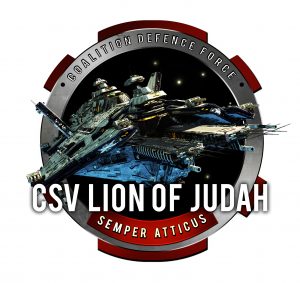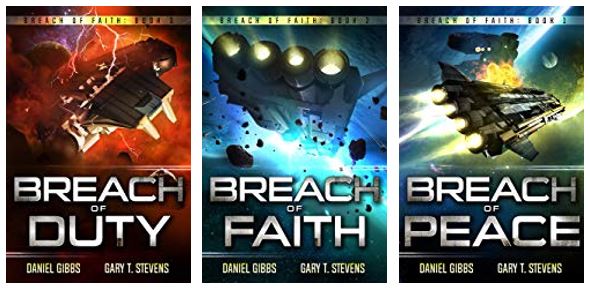Author Spotlight Interview: Daniel Gibbs
This week we chat with Daniel Gibbs – author of the Echoes of War series, which seamlessly blends hard science fiction with deep and emotional questions about faith, morality, and religion. With dozens of rave reviews across the series, Gibbs is fast becoming one of the most respected authors in his genre – and it’s fascinating to learn a little more about the inspirations and process that led him to embark on this epic, galaxy-spanning saga.

HG: Okay, so who is Daniel Gibbs? Who is the man behind this star-spanning science fiction saga?
DG: An interesting question indeed! I’d say I’m a big time nerd and something of a goof. I love college football (Go Noles!), and have probably a thousand plus sci-fi novels on my various bookshelves, both paperback and hardback. I’m a defense contractor when I’m not writing military science fiction and space opera stories. Getting dangerously close to forty, too! I love computers, and my career so far has been focused around building interesting things for the Navy. In my youth we moved around the southeast U.S. quite a bit. Decent sized cities, one super small town with two traffic lights, and a couple of years overseas. My home plate is South Carolina.
HG: Who are your favorite sci fi writers? I’d say there were shades of Robert Heinlein to your books.
DG: My all time favorite sci-fi author is probably David Weber. I loved Mutineer’s Moon, and the series it spawned. Robert Heinlein is in my top ten for sure, as is Orson Scott Card, Issac Asimov and Jules Verne.
HG: When did you get bitten by the writing bug? What was the first thing you ever wrote?
DG: This one requires stepping into the way back machine! To show how much of a super nerd I am, back when I was ten/eleven years old, I played these old text based computer games facilitated by telnet connections (props to anyone who remembers this!) They were pretty popular among college students, and facilitated role playing between groups of up to hundreds of people. That really stimulated writing creatively for me, because you had to describe what your character was doing in the role play. Each action was a paragraph or two. I was pretty decent at it, and I was pretty decent at describing objects and rooms, to the point people would ask me to write things for them. That was where it started. I got the idea for Echoes of War back in those days, and tried as early as age fifteen to write it, though the result was poor, at best.
HG: How did you come up with the incredible concept for your literary universe? It’s such a strong concept!
DG: That’s a great question. It’s one I’ve had for so long, I had to stop and really think about it. A few things coalesced. One was what would it take to stop inter-religious wars on Earth; another was that the standard trope of religion disappearing after we get into space or discover aliens, I find unrealistic. I settled on an answer that if faced with an external threat, almost any group of people can set aside its internal differences – like President Reagan pointed out in his famous UN speech that referenced invasion from outer space.
HG: How did you come up with the way religion is woven into the names of the ships – like the Lion of Judah?
DG: That name just popped into my head one day back when I was 15 and trying to write this thing for the first time. I knew immediately it would be the name of the “hero” ship in the series. The Lion of Judah has many meanings across several religions, but it fits thematically.

HG: Where did you get the idea of the hero? It’s SUCH a strong concept to have to choose between faith and saving your society as you know it.
DG: That was there from the beginning, too, though it’s grown over time. I’ve had the honor of knowing some incredible servicemen and women in the USN (United States Navy) and USMC (United States Marine Corps), thanks to my line of work. Seeing how they perform day in, day out, has been an influence to my work.
HG: How did your line of work influence your stories?
DG: I’m a defense contractor – specifically an information technology specialist. For the last fifteen years I’ve seen and done some interesting stuff, some of which I hope was useful! I’ve met many people in this field that are either active duty or former military, and made a lot of friends. A constant theme that struck me was the cost of war. Don’t take that to mean I’m coming at my writing from an anti-war position – I’m not – but most action movies and a lot of military fiction only looks at the glorious side of war. Seeing the enemy run away, defeated is a great thing. But it’s not the only thing. Our men and women under arms know what it means to have to confront the reality of war after the battle. I wanted to shine a light on that through my writing, and I hope I have.
HG: I love that perspective. What have the reactions been? Any negativity/positivity that made you stop and think?
DG: You know, I’ve had some emails and reviews that were amazing. A retired Marine wrote in a review that there were parts of the books that made him emotional as they dealt with loss. To me, that’s the mark of getting it right. A few folks have reached out and thanked me for creating a Jewish hero – that was neat too! On the negative side, there’s been a few folks who clearly don’t care for the religious aspect and have made that known. That’s the great thing about America: I can write a book the way I want, release it, the marketplace of ideas will decide if it has merit, and those who disagree are free to say so.
HG: Tell me about the writing process. Are you plotter or a pantster? I mean, you must be a plotter because of the world building you did. I’m excited to talk to you about that. How did you go about imagining and creating your vision of a possible future?
DG: I think I’m something of a combination when it comes to writing. I don’t have iron clad plots laid out for each book – they evolve as I write them – but I do have an iron clad if you will, “universe bible”, that lays out the ground rules. One of the things I am going to do at some point is add a glossary to my novels so all the technology, ships, etc, are defined. That kind of stuff was built up over 20 years. As to the second question, this will seem cheesy, but it all just fell into place for me. Its difficult to fully describe but when I’m in the zone and putting things together for my novels, they happen. I always keep something to jot notes down around – because inspiration can happen anywhere. Even in a meeting with a bunch of government guys talking about IT solutions!
HG: Do you have a writing space? Like a home office? Or do you write on the fly?
DG: I do have a home office – and a nifty laptop. I switch between the two seamlessly. Writing can happen anytime… I remember once having to stop for an hour at Starbucks on a road trip just so I could put a two thousand word scene down that was crystal clear in my head.
HG: You say writing can happen at any time, but is there anything you do to get into the zone? Rituals, or anything?
DG: I’ve talked to a number of writers that have a specific set of things they do, a ritual if you will – but not me. I typically sit down at my computer right after exercise and getting a shower, then pound away for an hour or two. If I’m on what I call a writing vacation, I’ll write all day. Interestingly enough, my maximum production is rarely over 3500 words in a day. Any more, and I feel the quality of my words is poor.
HG: What’s the best advice you’ve ever received about writing?
DG: Wow, that’s a hard one. I say this because I’ve been blessed enough to speak with several mid-list authors, including Mr. VanDyke, who’s mentored me for the last year and half. I’ve gotten so much information, guidance and help. I suppose if you set aside all of the marketing and sales advice – because lets face it, an indie author has to become a near expert on marketing to sell his or her work – the urging I received from the beginning – write what appeals to me and stay true to my vision – was excellent. I realize that integrating faith with military science fiction is a bit, well, its not done really. But, I believe there’s room for it and I’ll let the market judge the worth of what I’ve written.
HG: So, your new book in the Echoes of War series comes out in January, 2020. Can you give us a sneak peek at what that will deliver?
DG: Run the Gauntlet is book six of the Echoes of War series. I had initially planned to end the first “arc” if you will, of Echoes of War, on book six. I had originally planned for what happened in it to occur “off camera” if you will. But, the more I thought about it – a daring raid behind enemy lines – the more ideas I had, and in the end, I had to add another book to the series. So, Run the Gauntlet finds David Cohen and the Lion of Judah only a few dozen light-years from Earth, trying to tackle the near-impossible task of taking down two major space installations at the same time. Lots of characters from previous books appear, and one of them is a cross over from the Breach of Faith series. As always, there’s a focus on the aftermath of the battle, and the complex political situation unfolding in the Terran Coalition.
HG: And you’re starting a new series in December, Breach of Faith. Tell me about that!
DG: Breach of Faith (the new series) is a co-authored work with a very good, and old friend of mine – Gary T. Stevens. Well, that’s his pen name. Gary and I have known each over for a couple of decades now. He’s always nurtured the dream of becoming an author, and encouraged me over the years. So, it was an ideal thing for both of us. Breach of Peace, the first book in the series, takes us into the world of Captain James Henry. He’s an independent spacer, commanding a medium size cargo hauler. Unlike the heroes of Echoes of War, Henry has lost everything. His country, faith, even his place in society after he was stripped of rank and thrown out of the CDF. Now, he moves cargo of various legalities across neutral space and hopes for the next payday, with loyalty only to himself and his crew. Still, there’s the remains of an honorable and decent man inside of James Henry. The question is, can he reclaim the things that used to make him who he was?












1 Comments